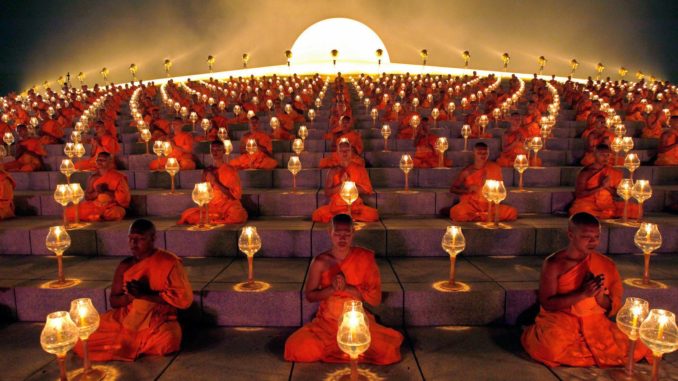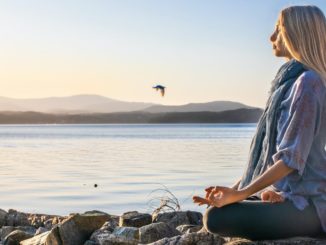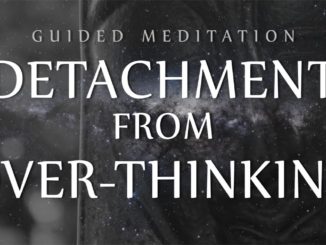
As a lineage carrier for Shigong Jou Tsung Hwa’s system of tai chi chuan and Taoist internal cultivation, students often ask me what is the difference between Zen Buddhist meditation practices and Taoist (Daoist) meditation. First, I’d like to focus on their similarities and then delve into their differences.
Both systems are Eastern. Both emphasize the cultivation of the mind by cutting to the “Truth” of things. Instead of focusing on rituals, or what is wrong and what is right based on someone else’s dictations, the goal is to be extremely candid and nonjudgmental with oneself to cut through one’s own limited thinking. The idea is that if we transcend our human ego and reflexive thinking, based on information that we derive through our senses (namely, seeing and hearing), then we will arrive at the Truth. It’s all about “getting out of our own way.”
There are many different sects of Buddhism and Taoism. Some are more shamanic and ritual based. But the sects influenced by Zen, and the more intellectual philosophical schools of Taoism, are the most “minimalist.” These schools of cultivation seek to keep the “tools” to a minimum and root all development from the internal, rather than external sources. The way to transcend out into the universe is to dive more deeply within.
As similar as Zen and Taoism (Daoism) are, however, there are some stark differences. I have never heard a simple explanation that satisfied my question about this, so I meditated on this for a long time until I saw the global, overlying element. This is based on my personal experience in studying both Zen and Taoist forms of cultivation. If you are either a practicing Buddhist or Taoist, then you may agree or disagree with me, and that is all well. I welcome you to post your thoughts on this in the comments section of my blog at internalgardens.com, or NJTaiChiClasses.com, and hopefully we can help others to derive their own satisfactory conclusions.
Considering Zen, the overall path to enlightenment is accomplished via “Mind is everything.” Everything is mind. And so is nothing! It’s all about what you think or don’t think that makes up or blocks your direct experience. Zen cultivation also dictates that one should avoid intoxicants and overindulgence, thus keeping your senses, mind and desires as uncorrupted as possible. Exercise and aesthetic practices let one directly experience how powerful physical and psychological urges can lead to all kinds of thoughts and self-untruths. The body is otherwise considered “unimportant,” or “an illusion” as it too, passes away into the current of time; the conditional. Universal mind is enduring; unconditional. Conceptualizations of reality and the universe cannot ever be defined by the limits of the little human mind. Reality is to be directly experienced.
Taoists are rather in accord with these tenets, except for one stark difference. The Taoist will cultivate the body and its energies/reflexes/urges, etc, along with the mind, for mind and body are considered as one. Much the same way the Taoist concept of yin and yang cannot be separated, as one relies on the other for their definitions. Some Taoists believe in physical immortality, while others believe in spiritual immortality but that the spirit must be cultivated into higher awareness nonetheless. The body/physical can assist. The chemical energies of the body can be transformed into a higher state of energy, thereby assisting the spiritual transformation toward enlightenment.
For example, Taoists have a concept of “Lian X hua Y.” The most common employment of this is, the concept of Lian Jing Hua Qi. This is also spelled, “Lian Ching Hwa Chi.” This means that the base sexual energy and vitality of the body, “jing” can be processed internally to become a more transcendent life force energy known as “qi.” Qi can then be transformed into spiritual energy, or “shen.” This employs sophisticated contractions/expansions, meditative and qigong practices along with a deep application of self-discipline and clarity of mind. The Daoist can do this on his/her own, or if fortunate enough while seeking to do so, along with a partner or soulmate – somewhat like the highest form of “partner yoga.”
Taoists also believe that negative emotional energy can be transformed into more positive energy, thus leading to healthier qi (life force energy) and shen (spiritual energy), which bolsters one’s path to enlightenment. Taoists also believe in certain exercises and basic eating practices that maintain optimal health. Buddhists will sometimes therefore claim that Daoists are “too attached” to the physical, and that this limits their path to enlightenment. I believe this is because those Buddhists see the physical as illusion, whereas the Taoist sees it as resource. As in physics, the Taoists believe that energy and matter are truly one and the same. The conceptualization of their differences causes the problem, whereas the experience (and use) of their one-ness leads to higher enlightenment.
Another problem lies in the “Go with the Flow” concept of Taoism. Buddhists point out how un-self-disciplined so many so-called Taoist practitioners are. The “Go with the Flow” mentality gets misused and distorted into people thinking it’s perfectly OK to be undisciplined in their eating or physical exercise. Nothing could be farther from the truth in true, traditional Daoist practices. The ego definitely does not like to hear this, but then why would any true cultivator be choosing to follow the edicts of his ego?
There is a lot more to this, such as what sutras Buddhists study, concepts of compassion and detachment, what the Taoist studies about the I-Ching (Yijing) or other Daoist writings, the concepts of yin and yang… but those are all details. The stark difference, I believe, is in the conceptualization and application of the physical vs “mental only” methods of enlightenment. It is simply a matter of personal choice. Both paths can lead to enlightenment, just as Route 3 and Route 80 in northern NJ both lead to Manhattan, New York City. It depends on where you are, what you like, and what works better for you.



